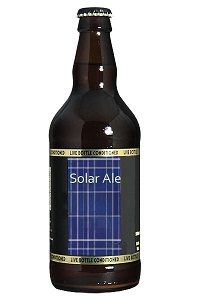Solar suds in Washington state? You betcha!
 Everybody enjoys a nice beer, but knowing that your suds are being made in a microbrewery powered by the sun, makes that Sun of Frog Ale at the North Fork Brewery taste that much better.
Everybody enjoys a nice beer, but knowing that your suds are being made in a microbrewery powered by the sun, makes that Sun of Frog Ale at the North Fork Brewery taste that much better.
Yes, this small brewery in Deming, Wash., will start installing an 8-kilowatt (kW) photovoltaic system in an attempt to become a net-zero energy brewery—in a temperate rainforest. The brewery owners said they chose to install the panels as a business decision and to encourage other people to install solar.
This small brewery, which has only 46 seats, also serves as a wedding chapel. It’s in the continental U.S.’s only temperate rainforest and definitely isn’t in the sunniest place in the country. The fact that the brewery is in a historical building meant that they couldn’t install the photovoltaic array on its roof, and instead Advance Energy Solutions, LLC, the project developer, will install a ground-mounted system by the brewpub.
Advanced Energy will start installing the system on Dec. 29.
This is North Fork’s first foray in to renewable energy, said brewery owner Vicki Savage.
Savage said she thinks the system will allow the brewery to become a net-zero energy brewery.
"We're hoping we even out to net zero, to where we're at least energy independent, if not off the grid," Savage said.
Savage knows that the location is not the most ideal place for solar panels.
"We're trying to just beat the drums," Savage said. "It takes a lot of optimism to put in solar panels in the northernmost part of the county in the middle of a rainforest."
The incentives offered by the government sweetened the deal to a point where the brewery could afford solar.
“Commercial systems are given a 30 percent rebate check within 60 days after connecting to the PSE [i.e. Puget Sound Energy] power grid,” she said. "For sure, one of the big deals was the financial incentives: a 30 percent rebate if you go with local vendors and local, made-in-Washington products. We never thought we could be in a position to afford it.”
Ultimately, the decision to go solar was a business decision. Even in the northern rainforest climate of Deming, the array will have a decent payback time.
“We expect this system to pay itself off in 7 years max,” Savage said.
Image courtesy of Chris Meehan's computer and his brain (Meehan's brain, no the computers).



